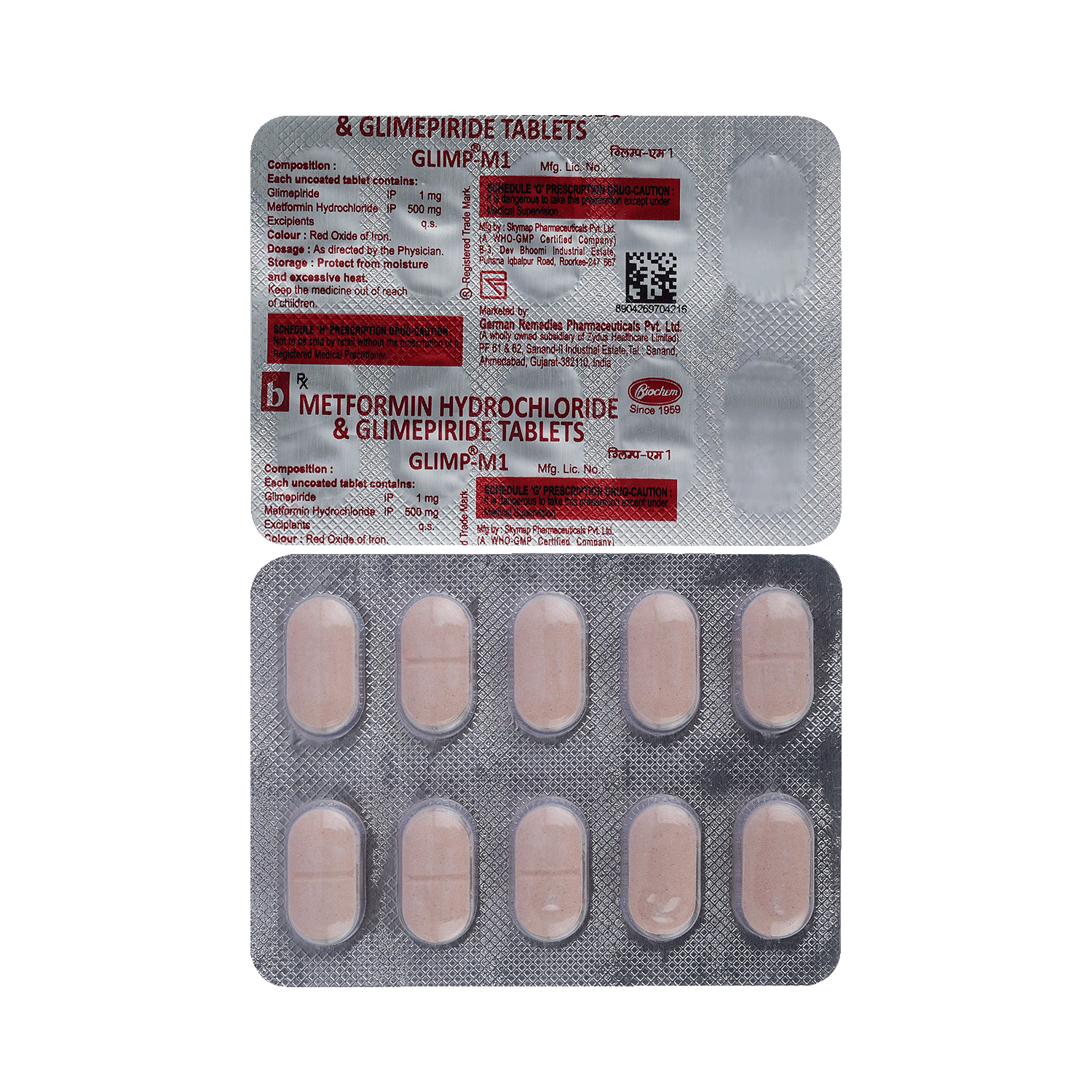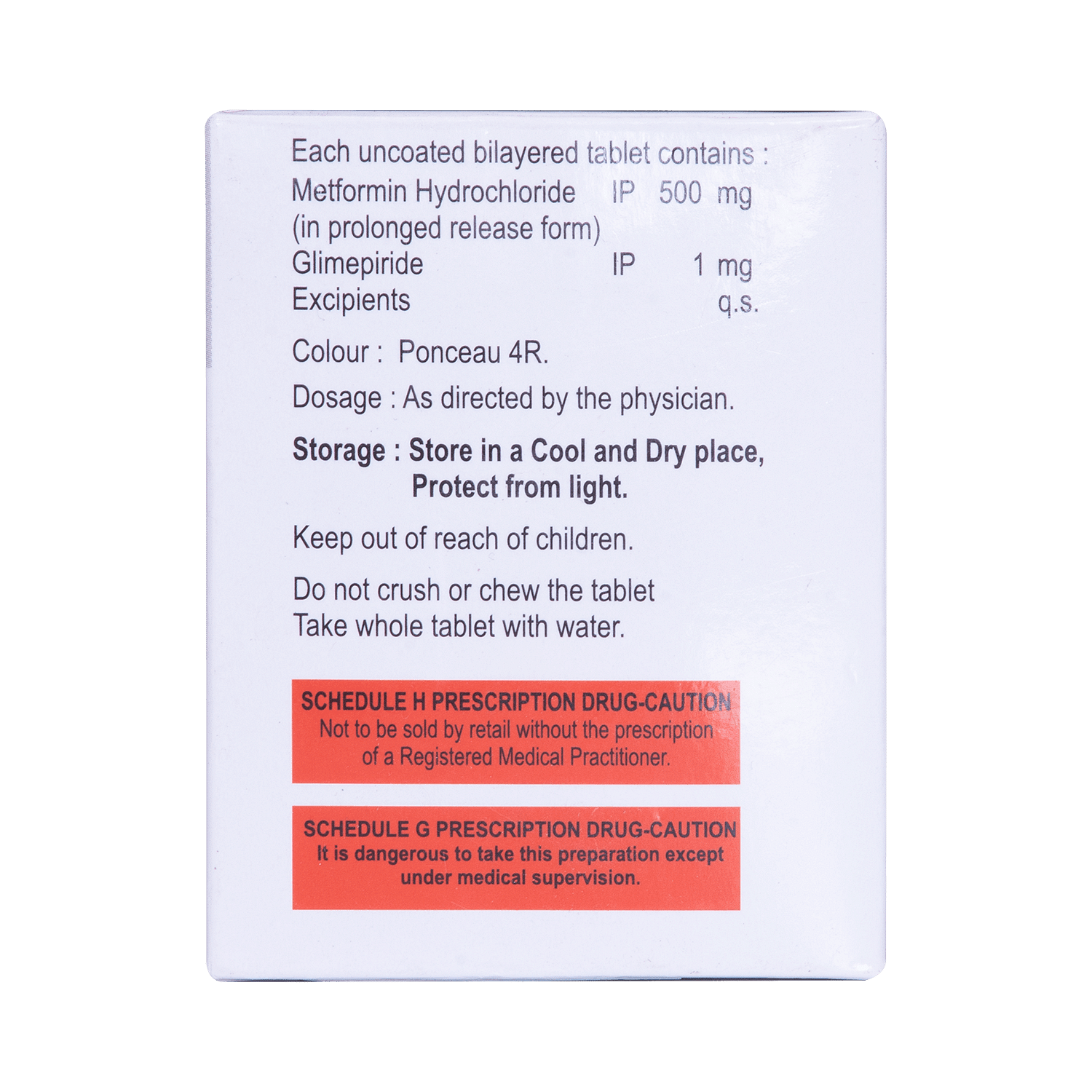
Merid 1mg/500mg Tablet
Manufacturer
Invomed Cotab Pvt Ltd
Salt Composition
Glimepiride (1mg) + Metformin (500mg)
Key Information
Short Description
Merid 1mg/500mg Tablet is a combination of two medicines used to treat type 2 diabetes mellitus in adults. It helps control blood sugar levels in people with diabetes.
Dosage Form
Tablet
Introduction
Merid 1mg/500mg Tablet belongs to a category of medicines known as anti-diabetic drugs. It is a combination of two medicines used to treat type 2 diabetes mellitus in adults. It helps control blood sugar levels in people with diabetes.
Directions for Use
Take this medicine in the dose and duration as advised by your doctor. Swallow it as a whole. Do not chew, crush or break it. Merid 1mg/500mg Tablet is to be taken with food.
How it works
Merid 1mg/500mg Tablet is a combination of two antidiabetic medicines: Glimepiride and Metformin. Glimepiride is a sulfonylurea which works by increasing the amount of insulin released by the pancreas in order to lower the blood glucose. Metformin is a biguanide which works by lowering glucose production in the liver, delaying glucose absorption from intestines and increasing the body's sensitivity to insulin.
Quick Tips
Take it with food to lower your chance of having an upset stomach. Monitor your blood sugar level regularly while you are taking this medicine. It can cause hypoglycemia (low blood sugar level) when used with other antidiabetic medicines, alcohol or if you delay or miss a meal. Inform your doctor about your diabetes treatment if you are due to have surgery under a general anesthetic. Tell your doctor immediately if you experience any deep or rapid breathing or if you have persistent nausea, vomiting and stomach pain as Merid 1mg/500mg Tablet may cause a rare but serious condition called lactic acidosis which is an excess of lactic acid in the blood.
Related Medicines

Glimp-M 1 Tablet

Glimfirst M1 Tablet

Metffil G1 Tablet

Bepride SF 1mg/500mg Tablet

Angioglim M 1mg/500mg Tablet

Glimaril 1mg/500mg Tablet

Glucut 1 MT Tablet

Glimivance M 1mg/500mg Tablet

Glycefast G 1mg/500mg Tablet

Glytab M 1 mg/500 mg Tablet
Frequently asked questions
What are the recommended storage conditions for Merid 1mg/500mg Tablet?
Store Merid 1mg/500mg Tablet in its original container, tightly closed. Follow the storage instructions provided on the packaging or label. Discard any unused medication responsibly and ensure it is not accessible to pets, children, or others.
Can the use of Merid 1mg/500mg Tablet lead to lactic acidosis?
Yes, taking Merid 1mg/500mg Tablet can result in lactic acidosis, a medical emergency caused by elevated blood lactate levels. This rare side effect is particularly concerning for individuals with kidney disease, older adults, or those who consume excessive alcohol. Symptoms include muscle pain or weakness, dizziness, tiredness, cold sensations in arms and legs, difficulty breathing, nausea, vomiting, stomach discomfort, or a slow heart rate. If you experience these symptoms, discontinue use and consult your doctor immediately.
What is Merid 1mg/500mg Tablet?
Merid 1mg/500mg Tablet is a combination medication comprising glimepiride and metformin. It is used to treat type 2 diabetes mellitus (DM) in adults, enhancing blood glucose levels when combined with a proper diet and regular exercise. Glimepiride works by increasing insulin release from the pancreas, while metformin reduces liver glucose production and improves insulin sensitivity. This combination is not intended for treating type 1 DM.
What are the possible side effects of Merid 1mg/500mg Tablet?
Common side effects associated with Merid 1mg/500mg Tablet include hypoglycemia (low blood sugar), altered taste, nausea, stomach discomfort, diarrhea, and headache. Rare but serious side effects may include lactic acidosis. Long-term use can also lead to Vitamin B12 deficiency, potentially causing anemia, nerve problems, tingling sensations or numbness in hands and feet, weakness, urinary difficulties, changes in mental status, and balance issues (ataxia). Regular monitoring of blood sugar levels is essential.
Can the use of Merid 1mg/500mg Tablet lead to Vitamin B12 deficiency?
Yes, long-term use of Merid 1mg/500mg Tablet can result in Vitamin B12 deficiency due to interference with stomach absorption. Untreated, this may cause anemia and nerve issues, leading to symptoms such as tingling sensations or numbness in hands and feet, weakness, urinary problems, changes in mental status, and difficulty maintaining balance (ataxia). To prevent these complications, consider supplementing with Vitamin B12 at least once a year.
Can the use of Merid 1mg/500mg Tablet cause hypoglycemia?
Yes, taking Merid 1mg/500mg Tablet can lead to hypoglycemia (low blood sugar). Symptoms include nausea, headache, irritability, hunger, sweating, dizziness, fast heart rate, and feeling anxious or shaky. These symptoms are more likely if you skip or delay meals, consume alcohol, over-exercise, or take other antidiabetic medications concurrently. Regular monitoring of your blood sugar levels is crucial.
Is it safe to take alcohol while I am also taking Merid 1mg/500mg Tablet?
No, combining Merid 1mg/500mg Tablet with alcohol can lower your blood sugar levels and lead to hypoglycemia. It may also increase the risk of lactic acidosis.


